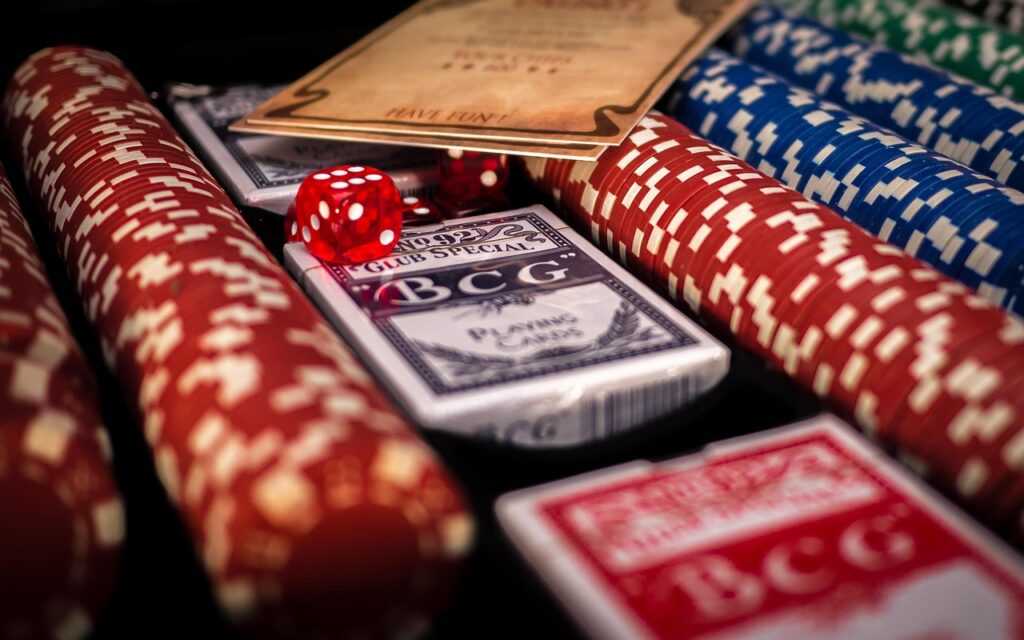Understanding the Basics
To excel at poker, mastering the fundamentals is crucial. A solid grasp of the game’s rules, hand rankings, and strategies forms the foundation for becoming a pro.
Rules of the Game
Poker’s foundation lies in its rules. Whether playing Texas Hold’em, Omaha, or Seven-Card Stud, understanding the rules is essential. Each player receives a set number of cards, with the goal being to form the best possible hand. The game proceeds through betting rounds where players can check, bet, fold, call, or raise. The objective is to win chips by having the best hand or by making other players fold.
Hand Rankings
Knowing hand rankings is vital in poker. The hierarchy determines the winning hand in a showdown. Here are the key hand rankings from highest to lowest:
- Royal Flush: A, K, Q, J, 10, all of the same suit.
- Straight Flush: Five consecutive cards of the same suit.
- Four of a Kind: Four cards of the same rank.
- Full House: Three of a kind plus a pair.
- Flush: Five cards of the same suit, not in sequence.
- Straight: Five consecutive cards of different suits.
- Three of a Kind: Three cards of the same rank.
- Two Pair: Two pairs of different ranks.
- One Pair: Two cards of the same rank.
- High Card: The highest card if no other hand is achieved.
A deep understanding of these basics empowers players to judge their hands accurately and make knowledgeable decisions during play.
Developing Your Skills
To become a poker pro, refining your abilities is crucial. Focus on building a solid foundation by delving into three essential areas.
Strategic Thinking
Strategic thinking involves planning your moves based on probabilities, reads, and game theory. Professional poker players don’t rely on luck; they make calculated decisions. Study the concepts of pot odds, implied odds, and expected value to enhance decision-making. For example, understanding when to fold a marginal hand can save chips over time. Review hand histories and analyze your actions to identify patterns and areas for improvement.
Bluffing Techniques
Bluffing is more than pretending to have a strong hand; it’s about exploiting your opponents’ tendencies. Pay attention to opponents’ cues and betting patterns; for instance, when they bet weakly, they might hold weak hands. Mix up your gameplay to avoid predictability. Practice semi-bluffing, where you bet with a drawing hand, merging bluffing with a strategy that has potential to improve. Observing players’ reactions to your bluffs can give insights into their thinking process.
Bankroll Management
Effective bankroll management ensures you can sustain playing poker over the long term. Allocate your funds wisely and avoid risking more than you can afford to lose. Follow guidelines like not risking more than 1-2% of your bankroll on a single game. Track wins and losses meticulously to identify trends and adjust your strategy. For example, if you’re running low on funds, dropping to lower-stakes games can help rebuild your bankroll. This disciplined approach prevents financial strain and sustains your poker career.
Gathering Experience
To become a poker pro, accumulating real-world experience is essential. Deepen your knowledge and skills through various avenues.
Participating in Local Tournaments
I found local tournaments to be invaluable in sharpening my game. These events often attract a mix of casual and serious players. Observing different playing styles and strategies deepens strategic understanding.
Example: Weekend poker games at nearby casinos or community centers offer consistent practice against diverse opponents. Regularly engaging in these tournaments builds confidence and sharpens decision-making skills under pressure.
Online Poker Platforms
Online platforms offer a convenient way to gain extensive poker experience. Sites like PokerStars and 888poker host various games and tournaments, providing ample opportunities to play against a wide range of competitors.
Table of Popular Online Poker Platforms:

| Platform | Features | Number of Players | Types of Games Available |
|---|---|---|---|
| PokerStars | Tournaments, Cash Games, Freerolls | 200,000+ | Texas Hold’em, Omaha |
| 888poker | Tournaments, Bonuses, Mobile App | 100,000+ | Texas Hold’em, Seven Card Stud |
| partypoker | High Stakes, Private Tables | 50,000+ | Texas Hold’em, Omaha Hi-Lo |
Playing online helps in identifying opponents’ betting patterns and refining quick decision-making skills, essential for professional play.
Joining Poker Communities
Joining poker communities boosts learning through shared experiences and insights. Forums like TwoPlusTwo and Reddit’s r/poker provide platforms to discuss strategies, hand analyses, and tournament experiences.
Examples: Active participation in these communities uncovers advanced tactics and reveals common pitfalls. Interacting with seasoned players accelerates learning, providing mentorship and collaborative growth opportunities.
By incorporating these methods, continuous improvement and adaptation in poker become systematic, driving one closer to professional mastery.
Analyzing Your Gameplay
Reviewing your previous games and learning from professional players significantly boosts your poker skills.
Reviewing Past Games
Analyzing past games helps identify mistakes and discover patterns in opponents’ behavior. After each game, I review hand histories to understand my decisions. I focus on key hands where significant chips were won or lost. For example, by examining a failed bluff, I can rethink my approach to similar future situations.
I use software tools like PokerTracker and Hold’em Manager to analyze statistics. These tools offer insights into my playstyle, win rates, and areas needing improvement. By comparing these stats to professional benchmarks, I gauge my progress and set specific goals.
Learning from Professional Players
Observing seasoned players provides invaluable lessons. Watching live streams or recorded sessions on platforms like Twitch and YouTube showcases advanced strategies. When I view these sessions, I note how pros handle different scenarios, from early position raises to river bluffs.
Reading books and articles written by renowned professionals such as Doyle Brunson and Phil Hellmuth expands my theoretical understanding. By integrating their strategies into my gameplay, I enrich my tactical options and improve decision-making under pressure. Joining online training sites like Run It Once also gives access to structured lessons and expert advice directly from top players.
Building a Professional Mindset
Becoming a poker pro demands more than just mastering strategies; it’s crucial to develop a professional mindset for consistent success.
Emotional Control
Maintaining emotional control in poker is essential. Emotions can cloud judgment and lead to poor decisions. During high-stress situations, such as losing several hands in a row, keeping composure becomes critical. To manage emotions effectively, practice mindfulness techniques like deep breathing before each session. This helps maintain a calm state. Analyzing tilt triggers, such as losing to a bad beat, can also help in developing strategies to counter them. Keeping a poker journal to record emotional responses and patterns can aid in identifying and addressing emotional weaknesses.
Consistency and Discipline
Consistency and discipline set apart professional players. Consistency involves playing regularly and practicing continually. Maintaining a disciplined schedule for studying the game and reviewing past hands ensures improvement over time. Setting measurable goals, such as increasing win rates by a certain percentage each month, provides direction and motivation. Sticking to bankroll management rules, like not spending more than 5% of the bankroll on a single buy-in, ensures financial stability. Preparing for each session with a clear strategy limits impulsive decisions and promotes disciplined play.
Incorporating these elements into training routines strengthens the professional mindset, making it easier to navigate the ups and downs of poker while maintaining peak performance.



 Alanns Ritcheyers – Author
Alanns Ritcheyers is a skilled author at Smart Gamble Land, known for his expertise in winning techniques and the art of gambling strategy. With a keen focus on teaching advanced betting systems, Alanns' content is tailored to players eager to refine their approach to gambling. His methodical breakdowns of complex systems are designed to make challenging concepts accessible to a wide audience. Alanns is dedicated to helping players maximize their potential at the casino by blending strategy with practical tips for real-world application.
Alanns Ritcheyers – Author
Alanns Ritcheyers is a skilled author at Smart Gamble Land, known for his expertise in winning techniques and the art of gambling strategy. With a keen focus on teaching advanced betting systems, Alanns' content is tailored to players eager to refine their approach to gambling. His methodical breakdowns of complex systems are designed to make challenging concepts accessible to a wide audience. Alanns is dedicated to helping players maximize their potential at the casino by blending strategy with practical tips for real-world application.
